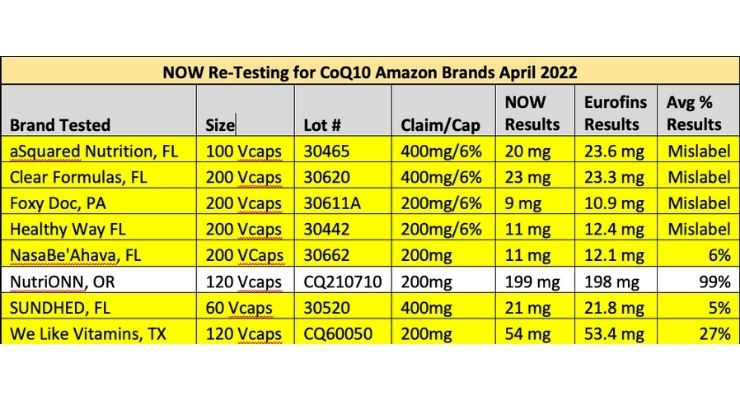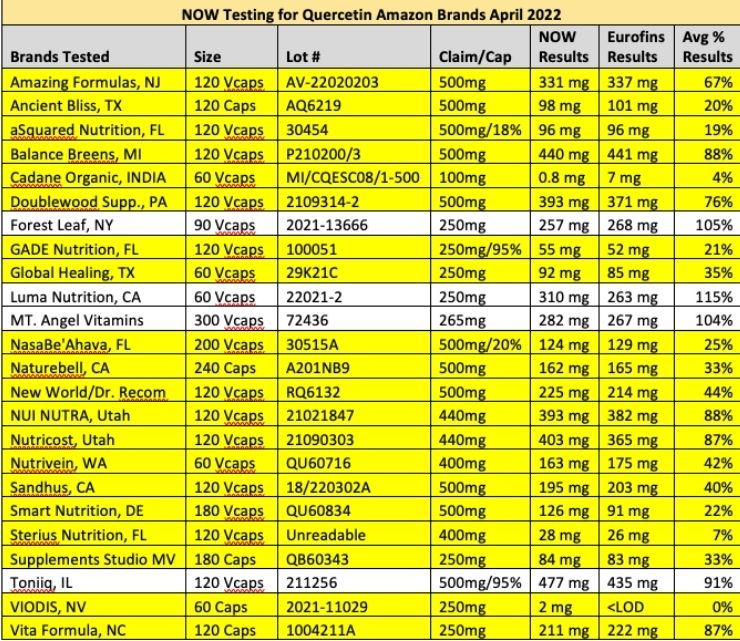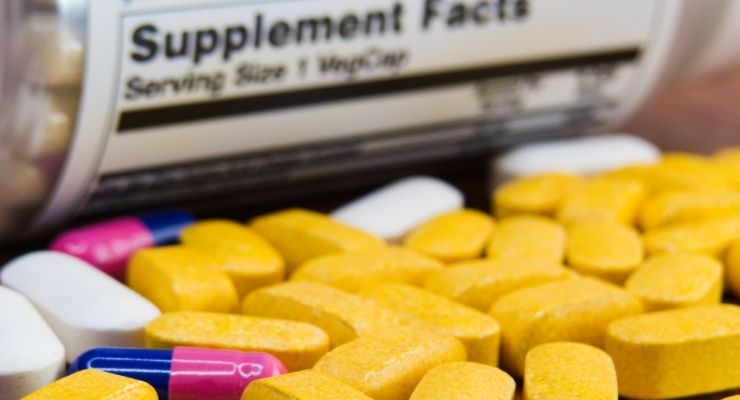05.10.22
When it comes to unfamiliar dietary supplement brands available on Amazon, “the cheating continues,” according to NOW, a leading manufacturer in the natural products industry.
NOW implemented a testing program back in 2017 to evaluate brands sold on the e-commerce platform. For its protocol, NOW purchases products sold by unheard of brands on Amazon for testing at both internal and external labs, and evaluates the results compared to label claims.
NOW reexamined eight brands of CoQ10 to see if those that were identified as low potency in testing done in 2020 had improved. However, tests found the same serious problems remain for seven out of eight brands tested. Additionally, as shown below, NOW found brands cheating by misrepresenting potencies through deceptive labeling tricks.
NOW purchased three samples of each product below and tested by HPLC both internally at NOW’s labs and externally at Eurofins labs. It is apparent by looking at lot numbers and bottle types that the same manufacturer is supplying multiple brands with the same fraudulent products (see Florida brands in the chart below).
 NOW chose to test a larger group of quercetin supplements, which has seen demand increase significantly during COVID-19, alongside higher raw material costs.
NOW chose to test a larger group of quercetin supplements, which has seen demand increase significantly during COVID-19, alongside higher raw material costs.
Notably, quercetin dihydrate 95% is the raw ingredient used in supplements. Some brands claim “400 mg Quercetin,” while others may claim “420 mg” Quercetin dihydrate,” but the potency is identical.
NOW inputs at least 10% overage of Quercetin dihydrate in order to compensate for Quercetin dihydrate being 95% Quercetin. This assures customers that full potency label claims are met. Unfortunately, many brands do not do this as demonstrated by test results from NOW and Eurofins.
“NOW has reported these findings to Amazon directly, as we did previously, but the problem products continue to be sold, and often as a ‘Sponsored’ (paid marketing) featured products,” said Dan Richard, NOW’s vice president of global sales and marketing.”
NOW said it plans to send a copy of its report to Amazon, FDA and the FTC. “Low potency brands do harm to consumers everywhere, as well as to honest businesses that make and sell quality products,” said Richard.

NOW implemented a testing program back in 2017 to evaluate brands sold on the e-commerce platform. For its protocol, NOW purchases products sold by unheard of brands on Amazon for testing at both internal and external labs, and evaluates the results compared to label claims.
NOW reexamined eight brands of CoQ10 to see if those that were identified as low potency in testing done in 2020 had improved. However, tests found the same serious problems remain for seven out of eight brands tested. Additionally, as shown below, NOW found brands cheating by misrepresenting potencies through deceptive labeling tricks.
NOW purchased three samples of each product below and tested by HPLC both internally at NOW’s labs and externally at Eurofins labs. It is apparent by looking at lot numbers and bottle types that the same manufacturer is supplying multiple brands with the same fraudulent products (see Florida brands in the chart below).
- Clear Formulas, aSquared, Foxy Doc and Healthy Way brands all mislabel their product as "400mg/6%" potency. This is deceptive when the front panel says "400mg" potency and the Amazon title says "CoQ10 400mg Max Strength." The customer gets less than 24 mg CoQ10 per capsule.
- NOW previously tested a variety of CoQ10 brands on Amazon in 2017, 2018, and 2020 with similar failing results. aSquared, Healthy Way, NasaBe'Ahava and We Like Vitamins were all under 35% potency in 2020 as well.
- Seven out of eight brands tested had less than 30% of the potency claimed
- Perhaps most alarming, three of the eight brands claimed to be in vegetarian capsules, but testing both at NOW and at Eurofins confirmed gelatin was used. The failing brands are Clear Formulas, Healthy Way and Sundhed.

Notably, quercetin dihydrate 95% is the raw ingredient used in supplements. Some brands claim “400 mg Quercetin,” while others may claim “420 mg” Quercetin dihydrate,” but the potency is identical.
NOW inputs at least 10% overage of Quercetin dihydrate in order to compensate for Quercetin dihydrate being 95% Quercetin. This assures customers that full potency label claims are met. Unfortunately, many brands do not do this as demonstrated by test results from NOW and Eurofins.
- Two brands labeled Quercetin deceptively by stating “18% potency,” the same trick as done with CoQ10.
- NasaBe’Ahava brand is a repeat violator, labeling Quercetin as “Each capsule contains 500mg Quercetin Dihydrate (20% potency).”
- Cadane brand, made in India, mislabels as 100mg Quercetin 10:1 extract, equivalent to 1000mg. Testing showed this brand to be one of the very worst for potency results with only 4% of claim.
- 20 out of 24 brands (in yellow in chart below) tested below 90% label potency and 14 out of 24 brands actually tested with less than 50% of labeled potency.
- Two out of 24 brands tested revealed lower cost gelatin capsules were used when the labels declared vegetarian/cellulose. Doublewood Supplements and NasaBe’Ahava both contain gelatin.
“NOW has reported these findings to Amazon directly, as we did previously, but the problem products continue to be sold, and often as a ‘Sponsored’ (paid marketing) featured products,” said Dan Richard, NOW’s vice president of global sales and marketing.”
NOW said it plans to send a copy of its report to Amazon, FDA and the FTC. “Low potency brands do harm to consumers everywhere, as well as to honest businesses that make and sell quality products,” said Richard.





























